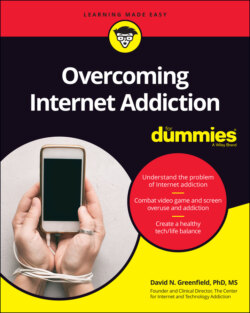Читать книгу Overcoming Internet Addiction For Dummies - David N. Greenfield - Страница 45
Tolerance and withdrawal
ОглавлениеTolerance and withdrawal are terms that we use in addiction medicine to describe the impact of a substance or behavior on our physical and psychological functioning:
Tolerance is a technical term to describe how the body (including the brain) develops decreased sensitivity to the intoxicating effect of a substance or behavior (such as Internet use); the effect of this decreased sensitivity is that it takes more of a drug or behavior to achieve the same degree of intoxicating effect. By intoxicating, I include the subsequent elevation of dopamine. This is a natural process and involves regulation of post-synaptic receptors mostly found in the nucleus accumbens. It’s important to note that most of the time, we are unaware that we’re developing a tolerance; to others who may be observing, it may seem obvious, but this is often a gradual process that goes on without the addict being conscious of it.
Withdrawal involves the physical and psychological reaction to decreasing or discontinuing a substance or behavior; as that dose decreases or stops, certain symptoms are experienced. The body and mind have acclimated to a certain level of intoxication and pleasure. Regarding Internet and technology use, the withdrawal effects might be expressed by reduced frustration tolerance, increased irritability, anger, anxiety, social isolation, and depression. Physical expressions of anger and rage have sometimes been noted, including breaking furniture or punching holes in walls. I have seen these withdrawal effects in patients over the years, and they can be quite disheartening to both patients and their families but are typically short-lived. In some cases, especially in adolescents and young adults, withdrawal effects can become quite concerning. Obviously, safety is the number one goal here, and if your child is threatening to self-harm or is damaging property, it might be necessary to obtain support by calling your local crisis intervention line or the police, or by going to the nearest emergency room for an evaluation. Obviously, this is not a desirable place to be, but I have seen some younger patients become so angry and in acute withdrawal that they lose their composure and self-control, and in those cases, it is always better to be safe and to protect yourself and your loved one.
The degree and amount of tolerance or withdrawal are not the determining factors for evaluating the degree or severity of an addiction. The amount of withdrawal does not indicate whether there is a diagnosis of Internet addiction. Addiction is a complex, biopsychosocial state that involves disruption in physical health, mood, motivation, time management, social relationships, and productivity. You can have an addiction to the Internet and have little or no withdrawal. Indeed, if getting through withdrawal or detoxing from the Internet, video games, or other screen behavior were sufficient, then no one who discontinued Internet or video game overuse would be experience addicted behavior again or experience a relapse, but this isn’t the case.
